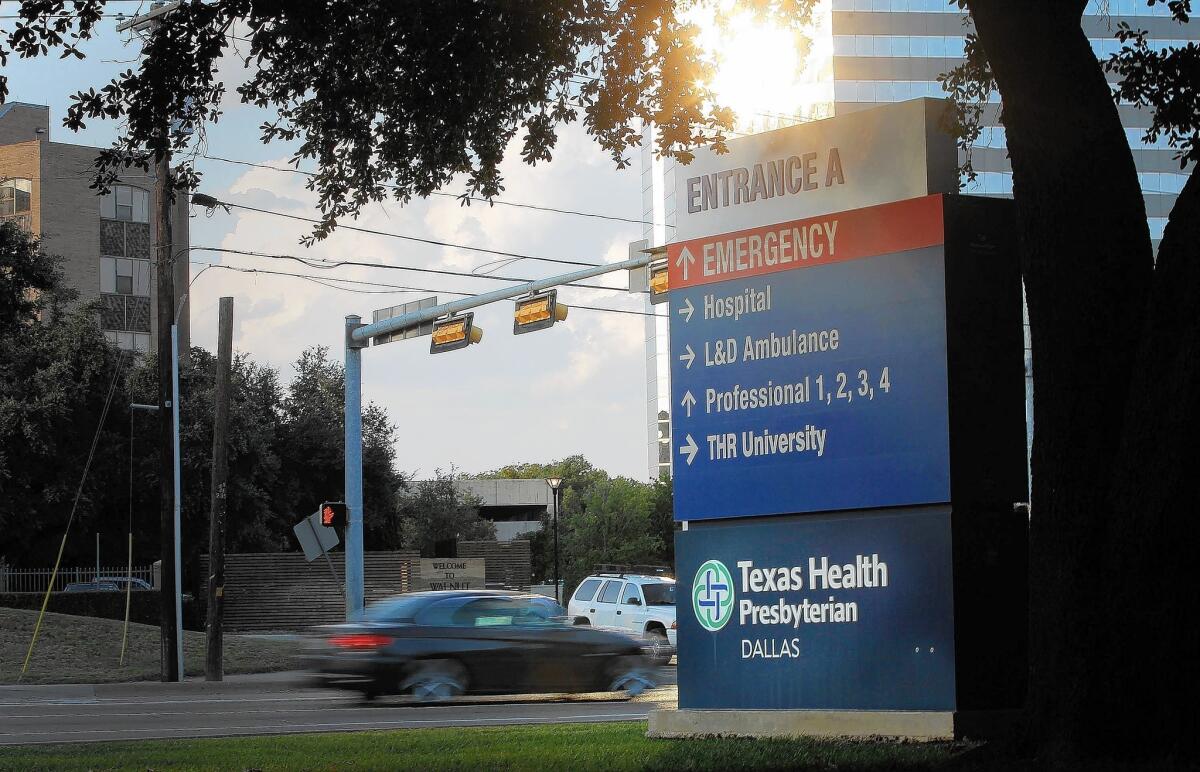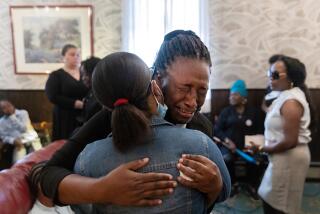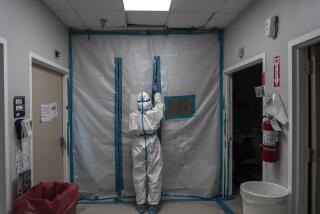Ebola case in Dallas signals health system lapse

- Share via
Reporting from Dallas — A man infected with the Ebola virus slipped through the cracks of a system designed to stop the disease from spreading, health officials conceded Wednesday as they isolated five schoolchildren who may have had contact with the ill man and rushed to identify others who spent time with him.
The patient, a Liberian named Thomas Eric Duncan, was listed in serious condition at Texas Health Presbyterian Hospital in Dallas after being taken there by ambulance Sunday morning, two days after his first visit to the hospital’s ER ended with doctors sending him away with antibiotics.
The children, who had been in the apartment where he was staying, were pulled from school, and a team of federal, state and local officials warned others who had spent time with Duncan to be on alert for fevers, body aches and other symptoms of Ebola.
At a news conference, Texas Gov. Rick Perry joined health experts in trying to reassure the public that Ebola, which has killed more than 3,000 people in West Africa, did not pose a danger to this nation.
“Rest assured, our system is working as it should,” Perry said.
“This is not West Africa. This is a very sophisticated city, a very sophisticated hospital,” said Dr. David Lakey, commissioner of the Texas Department of State Health Services. “The chances of it being spread are very, very small.”
But the failure of a system created specifically to deal with a possible Ebola case was a frightening reminder of the ease with which viruses once confined to remote corners of the globe can leap from continent to continent if the simple steps in place to control them are not followed.
“This has meant that nowhere in the entire world is safe; now it’s started to be a global pandemic,” Liberia’s assistant health minister, Tolbert Nyenswah, said in an interview in Monrovia, the nation’s capital.
As officials grappled with the breakdown in their system, a specially trained team fanned out through a Dallas neighborhood in search of anyone who had contact with Duncan, who had come to visit his fiancee.
The team faced a daunting task: navigating through apartment buildings where scores of different languages are spoken. They tried to alert residents to the potential danger without spreading panic.
The few people known to have had close contact with Duncan were told to remain at home, away from other people, and to monitor their temperatures. They included Duncan’s fiancee, who was said to be staying indoors and doing well.
Dr. Christopher Perkins, the Dallas County Health and Human Services medical director, said 12 to 18 contacts were being monitored for now. Their home isolation was expected to last three weeks, the incubation period for Ebola.
In addition, two paramedics and one paramedic intern who responded to the call Sunday to transport Duncan by ambulance were taken off duty and isolated for three weeks at home. None has tested positive for Ebola.
Residents of the Ivy Apartments, where Duncan stayed, were fearful. The neighborhood is dubbed the “Ellis Island of Dallas” for its large refugee population. Some said they were afraid to go near Texas Health Presbyterian, a mile away. Others said they planned to leave the apartment complex.
None of the children who were in contact with Duncan had showed signs of illness, so there were no plans to isolate any of their classmates, but extra health officials would be deployed in the public schools to allay fears, said district Supt. Mike Miles.
Dr. Joseph McCormick, a viral disease expert at the University of Texas Health Science Center at Houston and a former CDC lab director who has traced contacts for patients of Ebola and Lassa virus in Africa, said the tracing process varied depending on a patient’s condition.
In his experiences in Africa, healthcare workers often found themselves “in a pickle” when stricken patients were too ill to speak, he said.
“It happens a lot. They’re so sick they can’t give you any information. They’re moribund,” he said. In such cases, medical workers have to piece together potential contacts via interviews with a patient’s relatives or friends.
The lapse in hospital procedure that allowed Duncan to return home occurred late last week when he showed up at the hospital’s emergency room with a fever and abdominal pains. He had been in the United States since Sept. 20.
A nurse asked whether he had been in Africa, and he confirmed he had.
“Regretfully, that information was not fully communicated” to other medical workers, said Dr. Mark Lester, a hospital official. “As the team assessed him, they thought clinically it was a low-grade common viral disease.”
Initially the hospital said he had been treated Friday, but now says he arrived in the ER after 10 p.m. Thursday.
Duncan went back to the Ivy Apartments residence where he was staying. By Sunday morning, he was so sick he needed an ambulance to return to the hospital. He was put in isolation, tested for Ebola, and was confirmed to have the disease.
When paramedics arrived at the apartment Sunday, he told them he had been in Africa.
The three medical workers wore protective equipment while dealing with him.
The hospital sought to defend its handling of the case, saying it had no reason to suspect Duncan had Ebola when he first arrived.
“His condition did not warrant admission. He also was not exhibiting symptoms specific to Ebola,” it said in a statement released Wednesday.
Health officials said Duncan’s lack of symptoms also ensured he was able to board his flight out of West Africa, and to be allowed to enter the United States, where airport and airline officials have been warned to be on the lookout for people with Ebola-like ailments.
Because the man was not showing symptoms during his journey to Dallas, health experts say none of the hundreds of fellow passengers on his flights or people
he came in contact with at the airport would be in danger.
Ebola is only spread via contact with the bodily fluids of an infected and symptomatic person.
United Airlines issued a statement Wednesday saying Duncan came to the U.S. on Sept. 20 aboard Flight 951 from Brussels to Washington’s Dulles International Airport, and from Washington to Dallas-Fort Worth International Airport aboard Flight 822.
“This was not a failure of the screening processes at the airport. It’s a reality of the epidemic that we face,” Tom Kenyon, director of the CDC Center for Global Health, said in Liberia.
Glionna reported from Dallas, Susman from New York and Dixon from Monrovia. Times staff writers Christine Mai-Duc, Monte Morin and Matt Pearce in Los Angeles contributed to this report.
More to Read
Sign up for Essential California
The most important California stories and recommendations in your inbox every morning.
You may occasionally receive promotional content from the Los Angeles Times.












